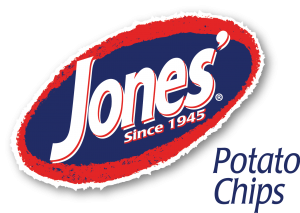About Us
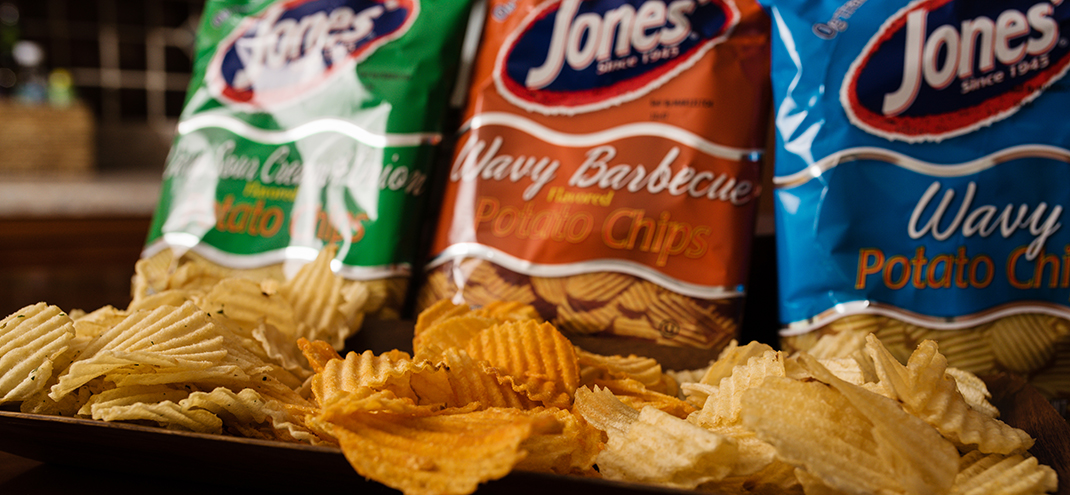
Jones’ Potato Chips Today
Our company has experienced a tremendous amount of change over the last ten years. New opportunities have allowed us to extend our sales area from a few counties in North Central Ohio to most of the United States. We are excited about the future and will continue to serve all of our customers with outstanding, high-quality products.
The History of Our Company
The Beginning It started with a dilemma. Back in the early 1940’s Frederick W. Jones was a potato chip distributor with no potato chips to sell. His normal supplier was struggling to keep up with production. The solution came in two parts. Frederick’s supplier gave their blessing to form his own potato chip company. Equally important, his supplier graciously provided much-needed experience, teaching Frederick how to produce excellent potato chips. The Jones Potato Chip Company was born. Frederick cooked his potato chips by hand in a kettle. The chips were lifted out of the hot oil in a basket and spread out on a counter to cool and to be salted. Then the potato chips would be put into wax bags, stapled shut, ready to be put into cartons to be delivered to local stores and restaurants. The wax bags did not protect the chips from light or moisture very well; providing quality potato chips to the customers was a challenge. The difficulties in producing a high quality product drove many of the local hometown potato chip companies out of business. The companies that overcame the obstacles to produce good-tasting products thrived.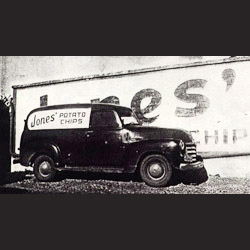
An early company vehicle
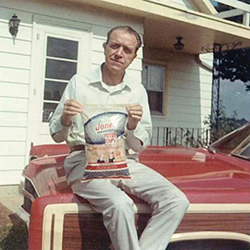
Frederick W. Jones, Founder
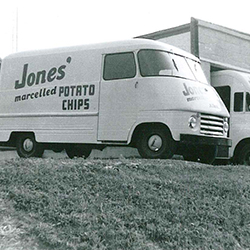
An old delivery truck
The Difference
When the Jones Potato Chip Company was created, there were no wavy potato chips in the Mansfield, Ohio, area. From the beginning, Jones Potato Chips used the term “Marcelled” to describe their wavy-style chips. Frederick used this to differentiate his product and get his potato chips into the local stores.
Once business was secured, it was essential to keep the customers. Frederick’s willingness to service his stores better than any of his competitors was a critical factor in maintaining the relationship with each customer. Frederick was also determined to make every package of Jones Potato Chips that left his factory of the highest possible quality. Frederick commented, “Stores sell potato chips one package at a time and customers eat potato chips one package at a time.” Frederick wanted each bag sold, each chip savored, to be an enjoyable experience.
The unique-tasting Jones Potato Chips became a local favorite and the company grew. In order to increase production, pieces of automated equipment were added to the cooking process. By the 1960’s everything from peeling potatoes, slicing, frying, salting, and packaging were fully automated.
In 2007, the Jones Potato Chip Company launched into a new adventure: producing potato sticks, also known as shoestring potatoes. The quality of our potato sticks meets or exceeds that of any other brand that is on the market today, and as a result, our production of this unique snack continues to increase.
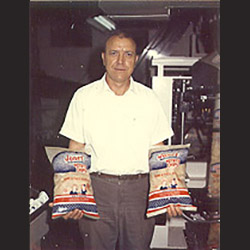
Frederick Jones, 1960s
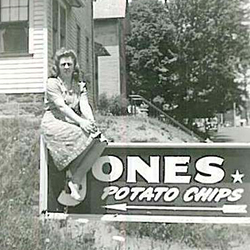
Elaine Jones, Fred's wife
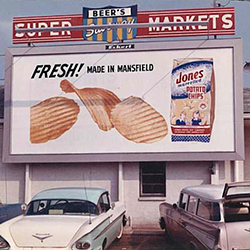
A local billboard in 1958
A Family Affair
The Jones Potato Chip Company is truly a family organization. Frederick, his wife Elaine, and all six of their children have worked in the business. Through the years, over forty family members have been employed by the company. Frederick and Elaine Jones retired in 1986.
The Jones Potato Chip Company strives to maintain a family atmosphere within the organization. Success would not have been possible without the steadfast and loyal effort of many individuals over the years. The hard work and dedication of our employees, both past and present, has contributed greatly to the Jones Potato Chip Company.
There is one part of the “family” that we have yet to mention: our customers. There are many customers that have eaten Jones Potato Chips for years and years. Thank you! If you haven’t tried Jones Potato Chips we invite you to join the “family”. It is with great pride that we continue to make great-tasting potato chips and snack foods and can truly say, “Family Made Since 1945.”
